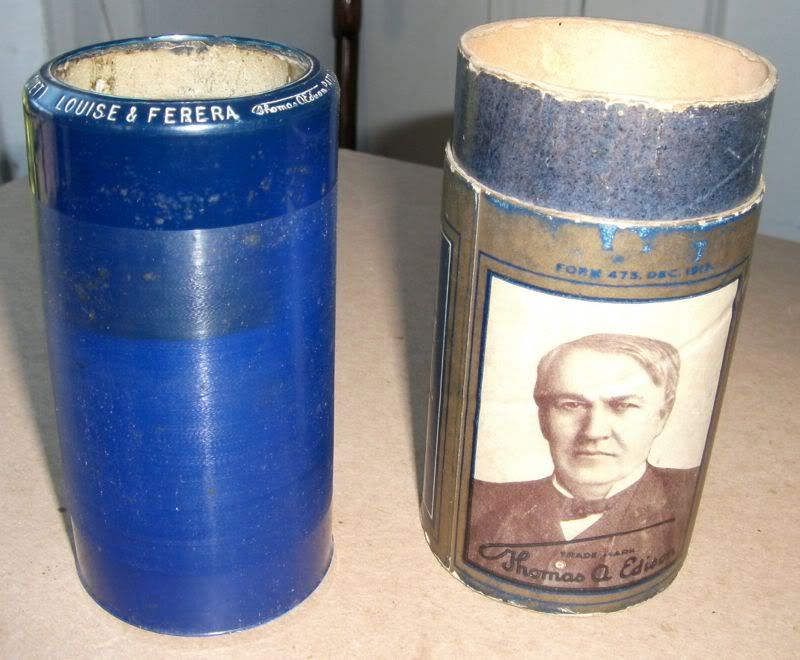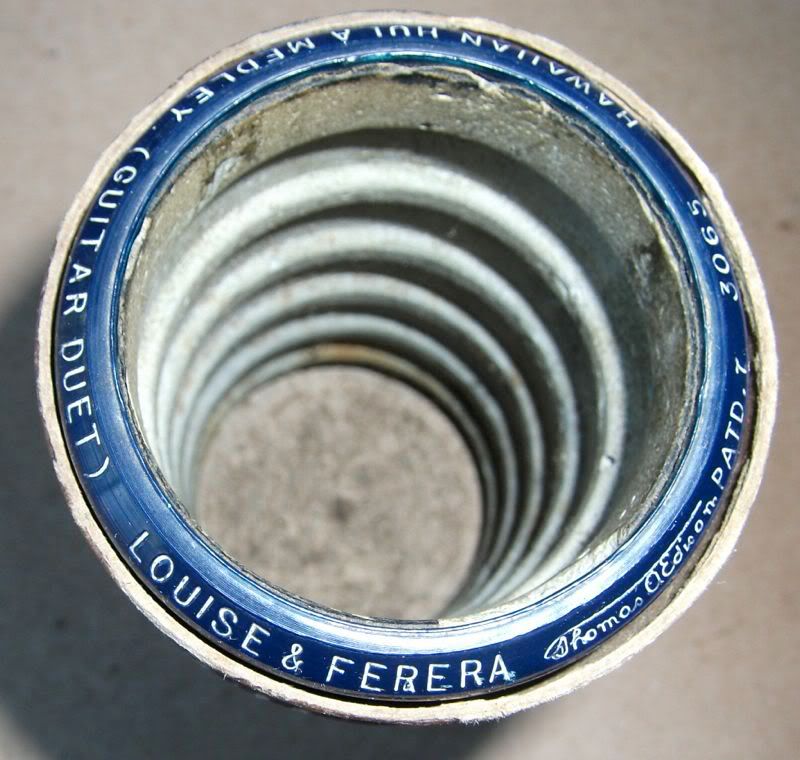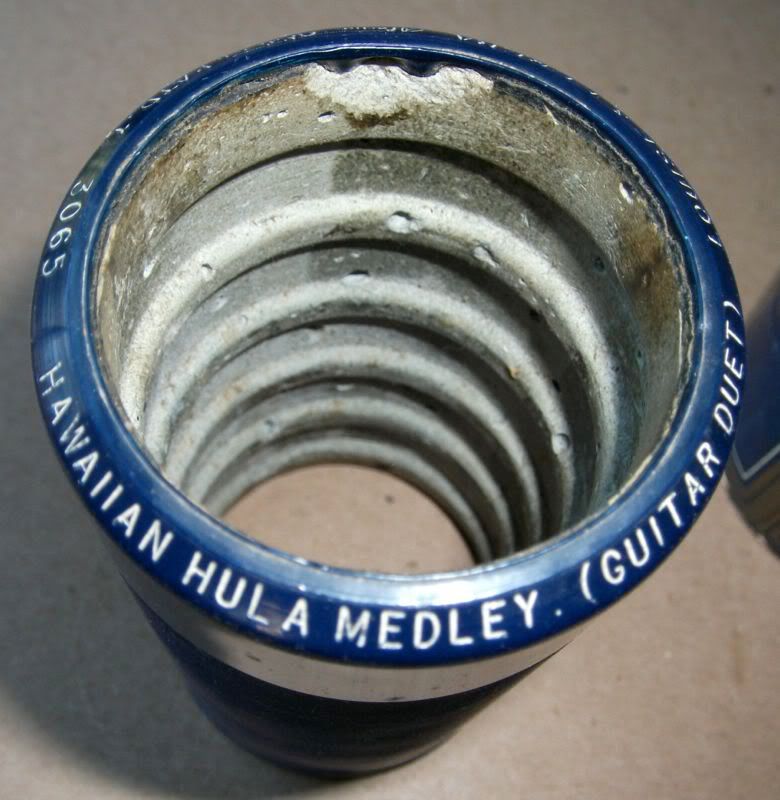| Author |
Topic: Edison Phonograph Cylinder Recording of Louise & Ferera |
Ron Yarboro
From:
USA
|
 Posted 9 Oct 2010 11:29 am
Posted 9 Oct 2010 11:29 am |
|
I recently found this phonograph cylinder recording of Louise & Ferera at a antique flea market. I thought It would be of interest. Because It's a phonograph cylinder, It's probably a acoustic lap steel recording. Could this be one of the earliest recordings of hawaiian lap steel guitar? Does anyone have any information about the recording "Hawaiian Hula Medley" by these musicians? Photos below.
Thanks,
Ron


 |
|
|
|
Ron Whitfield
From:
Kaaawa, Hawaii, USA
|
 Posted 9 Oct 2010 11:38 am Yowza!!
Posted 9 Oct 2010 11:38 am Yowza!! |
|
This should be a fun thread!
Good luck with your find, you never know what rarity is left out there to discover. |
|
|
|
Scott Thomas
|
|
|
|
Ron Yarboro
From:
USA
|
 Posted 9 Oct 2010 12:23 pm
Posted 9 Oct 2010 12:23 pm |
|
Hi Ron,
From the little that I've learned about cylinder records I found very interesting. In a nut shell, the blue amberol records (which is what I have) is made from celluloid instead of wax, which is what the early cylinders were made of, and is a 4 minute record that has a plaster of paris interior. I also learned that it has to be played on a machine that is made for a 4 minute blue amberol record, not the 2 minute machines because of the difference in the feed pitch. The blue amberols were issued from Nov. 1912-mid 1929. I also read (on you tube of all places) that Helen Louise was lost at sea in 1919. So The record must have been made between 1912-1919 If the information that I read is accurate. fascinating.
Ron
Last edited by Ron Yarboro on 9 Oct 2010 12:48 pm; edited 1 time in total |
|
|
|
Ron Yarboro
From:
USA
|
 Posted 9 Oct 2010 12:25 pm
Posted 9 Oct 2010 12:25 pm |
|
Thanks Scott |
|
|
|
Ron Yarboro
From:
USA
|
 Posted 9 Oct 2010 12:47 pm
Posted 9 Oct 2010 12:47 pm |
|
Hi Scott,
I just finished listening to the recording and I enjoyed It. Thanks again.
I also noticed that the duration is 3:05, which means that it would fit on a Blue Amberol Record and not the 2 minute wax cylinders.
Ron |
|
|
|
Andy Volk
From:
Boston, MA
|
|
|
|
Scott Thomas
|
 Posted 9 Oct 2010 1:35 pm
Posted 9 Oct 2010 1:35 pm |
|
Based on this info, I would guess this was recorded in 1916:
Their Edison recording debut, as Helen Louise and Palakiko Ferreira, was "Medley of Hawaiian Airs--No. 1," issued on Blue Amberol 2917 in July 1916. This was followed in August by the release of "Hilo March" on Blue Amberol 2927. The two songs were then issued back-to-back on Diamond Disc 50354. Within the year Edison issued on Blue Amberol several recordings of Ferera, usually accompanied by Helen Louise. In September Edison issued two Blue Amberols featuring the team: "Hapa Haole Hula Girl" (2956), composed by Sonny Cunha, and "Medley of Hawaiian Airs--No. 2" (2941).
The full info here:
http://www.gracyk.com/ferera.shtml
You should get in touch with the blogger and contribute your find. He doesn't mention that recording specifically. |
|
|
|
Ron Yarboro
From:
USA
|
 Posted 9 Oct 2010 1:41 pm
Posted 9 Oct 2010 1:41 pm |
|
Thanks Andy,
That about sums It up!
Ron |
|
|
|
Billy Tonnesen
From:
R.I.P., Buena Park, California
|
 Posted 9 Oct 2010 1:45 pm
Posted 9 Oct 2010 1:45 pm |
|
| Those early Hawaiian players certainly knew how to play staccoto notes (now called "Blocking"). |
|
|
|
Ron Yarboro
From:
USA
|
 Posted 9 Oct 2010 2:27 pm
Posted 9 Oct 2010 2:27 pm |
|
| Scott Thomas wrote: |
Based on this info, I would guess this was recorded in 1916:
Their Edison recording debut, as Helen Louise and Palakiko Ferreira, was "Medley of Hawaiian Airs--No. 1," issued on Blue Amberol 2917 in July 1916. This was followed in August by the release of "Hilo March" on Blue Amberol 2927. The two songs were then issued back-to-back on Diamond Disc 50354. Within the year Edison issued on Blue Amberol several recordings of Ferera, usually accompanied by Helen Louise. In September Edison issued two Blue Amberols featuring the team: "Hapa Haole Hula Girl" (2956), composed by Sonny Cunha, and "Medley of Hawaiian Airs--No. 2" (2941).
The full info here:
http://www.gracyk.com/ferera.shtml
You should get in touch with the blogger and contribute your find. He doesn't mention that recording specifically. |
Thanks again Andy for the link to the article.
Scott,
That was a good read. Maybe I should contact him, because he doesn't mention that the "Hawaiian Hula Medley' record was released by Edison on Blue Amberol. He wrote that it was released on the Emerson label in 1916 which It may have been.
Thanks,
Ron |
|
|
|
David Matzenik
From:
Cairns, on the Coral Sea
|
 Posted 9 Oct 2010 2:54 pm
Posted 9 Oct 2010 2:54 pm |
|
If you didn't catch the meaning, Palakiko is the pre and post contact Hawaiian pronunciation of Francisco where letters including F C T R were not in use. Billy Tonnesen raises an interesting point about blocking. I would like to see the opinion of other members because I suspect those early players were not really blocking as we think of it. Here is a great project on the subject of early recordings:
http://cylinders.library.ucsb.edu/search.php?query=hawaii*&queryType=@attr+1=21
_________________
Don't go in the water after lunch. You'll get a cramp and drown. - Mother. |
|
|
|
Clyde Mattocks
From:
Kinston, North Carolina, USA
|
 Posted 9 Oct 2010 5:34 pm
Posted 9 Oct 2010 5:34 pm |
|
Has no one picked up on that Jenks "Tex" Carmen's early '50s Capitol hit recording of "Hillbilly Hula is an adaptation, if not a direct rip off, of this tune?
_________________
LeGrande II, Nash. 112, Fender Twin Tone Master, Session 400, Harlow Dobro, R.Q.Jones Dobro |
|
|
|
Ron Yarboro
From:
USA
|
 Posted 9 Oct 2010 6:51 pm
Posted 9 Oct 2010 6:51 pm |
|
| David Matzenik wrote: |
If you didn't catch the meaning, Palakiko is the pre and post contact Hawaiian pronunciation of Francisco where letters including F C T R were not in use. Billy Tonnesen raises an interesting point about blocking. I would like to see the opinion of other members because I suspect those early players were not really blocking as we think of it. Here is a great project on the subject of early recordings:
http://cylinders.library.ucsb.edu/search.php?query=hawaii*&queryType=@attr+1=21 |
Hi David,
Thanks for the link. I did notice the staccoto notes played through out the song. I can't really comment any further regarding technique because I'm kind of new to lap steel guitar. It would be interesting to hear what more experienced players would have to say.
| Billy Tonnesen wrote: |
| Those early Hawaiian players certainly knew how to play staccoto notes (now called "Blocking"). |
Hi Billy
Thanks for your comment.
Ron |
|
|
|
Andy Volk
From:
Boston, MA
|
 Posted 10 Oct 2010 6:37 pm
Posted 10 Oct 2010 6:37 pm |
|
| It's always interesting to "listen back" to early recordings inevitably filtered by our experience of listening to a lifetime of recorded music. I don't think they were blocking in the modern sense - though the Hawaiian tilt bar method kind of automatically produces a kind of blocking. Prior to electric steel playing, the overall aesthetic was to contrast legato and staccato notes aided. Some of these early Hawaiian recordings remind me of a distillation of a wind band sound ... almost a military brass band feel. |
|
|
|
Alexa Gomez
From:
San Francisco
|
 Posted 17 Oct 2010 11:44 am
Posted 17 Oct 2010 11:44 am |
|
What an absolutely lovely little tune, all the more swank with the surface noise. So reminds me of listening to 78s on the box at my Granny's shack in San Marcos back in the day. Pity these precious recordings are so scarce. Anyhoo, I just love the playing, which obviously is done with such care. Very sweet.
_________________
Sister Alexa>SX Lap Pro>Rocktron Surf Tremolo>Pignose 7-100.
www.youtube.com/sisteralexa |
|
|
|
Bill Creller
From:
Saginaw, Michigan, USA (deceased)
|
 Posted 17 Oct 2010 8:38 pm
Posted 17 Oct 2010 8:38 pm |
|
My Dad had one of the Edison cylinder record players. I remember that it had a diamond needle in the head.
Don't remember what tunes or performers were on the records he had. |
|
|
|



